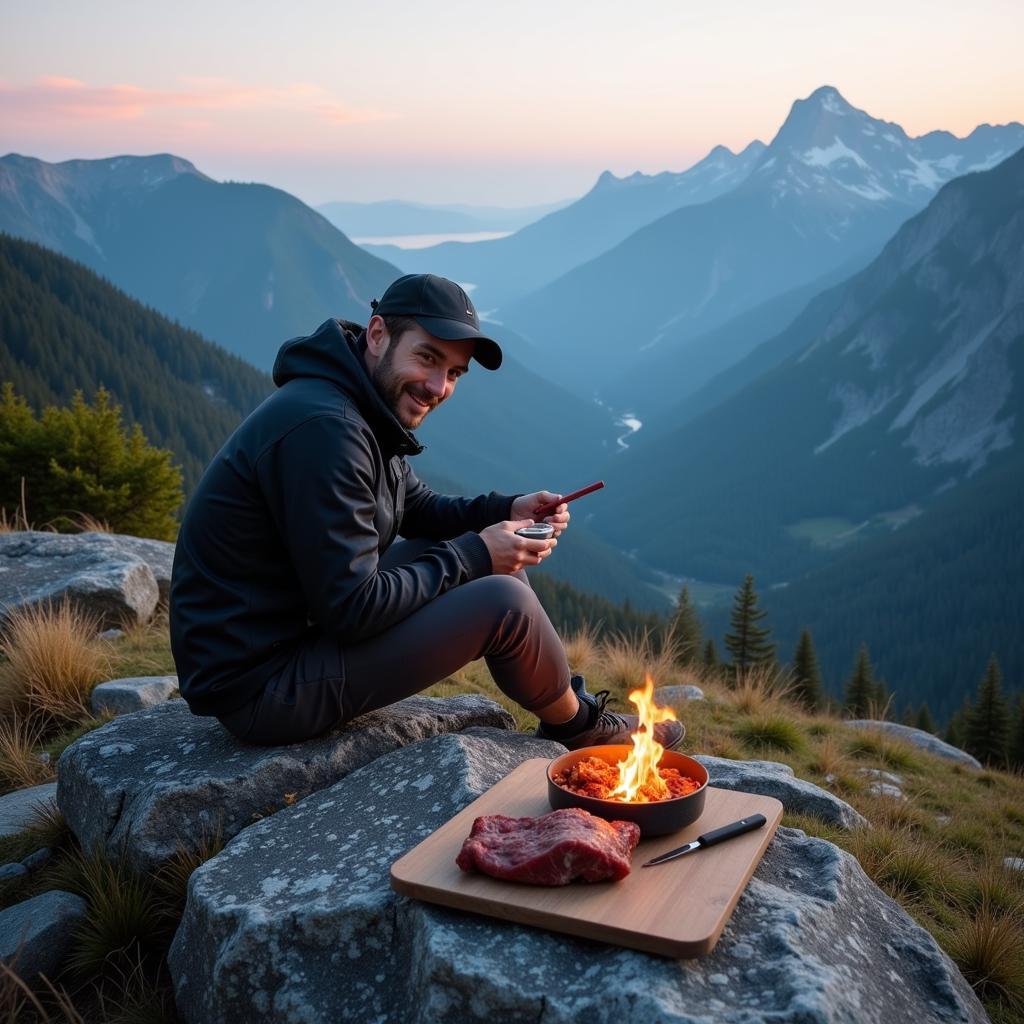Carnivore Backpacking Food is all about maximizing protein intake while minimizing weight and bulk for your outdoor adventures. This guide will explore the best options for carnivore backpackers, addressing common concerns and providing practical tips for planning and preparing your meals on the trail.
Choosing the Right Carnivore Backpacking Food
What you pack depends on your personal preferences, trip duration, and access to resupply points. Some popular choices include:
- Dehydrated Meat: Lightweight and versatile, dehydrated meat can be rehydrated with hot water for a quick and satisfying meal. Beef, chicken, and turkey are common options.
- Jerky: A classic backpacking staple, jerky provides a good source of protein and is easy to eat on the go. Look for varieties with minimal added sugar and preservatives.
- Pemmican: A traditional high-energy food made from dried meat, rendered fat, and sometimes berries, pemmican is a calorie-dense option for long trips.
- Canned Fish: While heavier than other options, canned fish like tuna, salmon, and sardines offer a convenient and flavorful source of protein and healthy fats.
Remember to consider factors like taste, texture, and ease of preparation when selecting your carnivore backpacking food.
Planning Your Carnivore Backpacking Meals
Planning is key to a successful carnivore backpacking trip. Consider these factors when crafting your meal plan:
- Trip Length: For shorter trips, jerky and pemmican may suffice. Longer trips might require more variety, including dehydrated meals and canned options.
- Daily Calorie Needs: Backpacking burns a significant amount of calories. Ensure your food choices meet your energy requirements.
- Storage and Packing: Organize your food into individual meal bags for easy access and to minimize waste.
How to Prepare Carnivore Backpacking Food
Preparing your food at home can save you money and allow you to control the ingredients. Dehydrating your own meat is a great way to customize your meals. You can also make your own pemmican with simple ingredients.
Dehydrating Meat for Backpacking
- Choose lean cuts of meat and slice them thinly.
- Marinate the meat if desired.
- Dehydrate the meat until it is completely dry and brittle.
- Store in airtight containers.
Tips for a Successful Carnivore Backpacking Trip
- Hydration is crucial: Drink plenty of water throughout the day, especially when consuming dried meats.
- Electrolyte balance: Consider supplementing with electrolytes, especially during strenuous hikes.
- Practice at home: Test your meal plan and cooking methods before hitting the trail.
- Leave no trace: Pack out all trash and dispose of it properly.
“Proper planning is the cornerstone of a successful carnivore backpacking trip,” says experienced backpacker and nutritionist, Sarah Johnson, RDN. “Knowing your calorie needs and selecting appropriate food options ensures you have the energy to enjoy your adventure.”
 Enjoying a Carnivore Backpacking Meal: A backpacker sitting on a rock overlooking a scenic vista, enjoying a meal of rehydrated meat.
Enjoying a Carnivore Backpacking Meal: A backpacker sitting on a rock overlooking a scenic vista, enjoying a meal of rehydrated meat.
Conclusion
Carnivore backpacking food can be both delicious and practical with proper planning and preparation. By choosing the right foods, preparing them effectively, and following these tips, you can enjoy a fulfilling and protein-packed experience on the trail. Don’t forget to adjust your food choices and quantities based on your individual needs and the demands of your specific backpacking adventure.
FAQs
- Can I only eat meat on a carnivore backpacking trip? Yes, the focus is solely on animal products.
- Is carnivore backpacking healthy? As with any diet, individual needs vary. Consult with a healthcare professional before making significant dietary changes.
- Where can I buy carnivore backpacking food? Specialty online retailers, some outdoor stores, or make your own.
- How much food should I pack? This depends on your caloric needs and trip length. Plan for enough calories to fuel your activities.
- What’s the best way to store carnivore backpacking food? Airtight containers or vacuum-sealed bags are ideal.
“For longer expeditions, incorporating a variety of protein sources is key to preventing palate fatigue,” advises wilderness guide and survival expert, Mark Davis. “Experiment with different dehydrated meats, jerky types, and even consider adding organ meats for a nutrient boost.”
For assistance, contact us at Phone Number: 02437655121, Email: minacones@gmail.com, or visit us at 3PGH+8R9, ĐT70A, thôn Trung, Bắc Từ Liêm, Hà Nội, Việt Nam. We have a 24/7 customer service team.